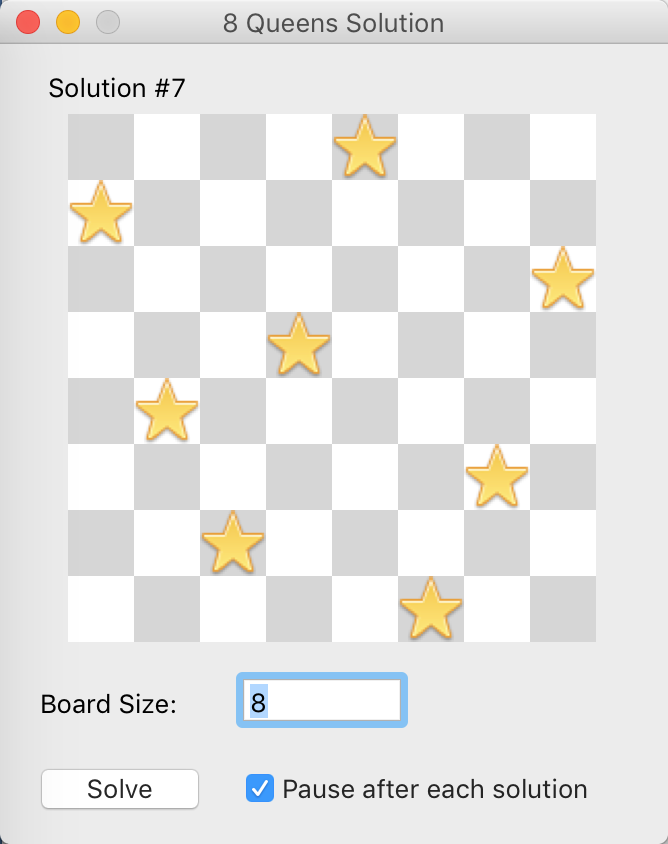Noted recently at the SQLizer blog, the SQL language was first created 43 years ago. And what is remarkable about that is that SQL is still used today. According to the Stack Overflow 2017 developer survey it is the #2 programming language. Not many languages remain in use for such a long period of time. Although we’re happy to also note that Xojo celebrated our 20th anniversary in 2016!
Comments closedYear: 2017
In my Algorithms class in my second semester of college (many, many eons ago), one of the project assignments was to write a program that would find all the solutions to the 8 Queens Problem.
Comments closedWorld Password Day brings attention to some simple steps everyone can take to secure their digital life: 1. Create Strong Passwords, 2. Use a different password for each account, and 3. Get a password manager, no, not a post-it note in your desk drawer!
The best password is one that is diffcult to guess. But difficult to guess takes on a new meaning when hackers use computers to do the guessing. Hence, the best password becomes one that would take a computer so long to guess that it’s not practical to do so. That means a long series of random characters and the longer and more random, the better, and a different password for every site you use.
Comments closedA few years ago it was reported that Russian hackers had stolen 1.2 billion usernames and passwords from a variety of websites. This was only possible because those websites were storing the actual password. Because it’s World Password Day and because this is web security 101, let’s discuss why there’s really no excuse for a website to store your password – ever.
Comments closedA question on the Xojo Forum got me thinking that it may not be obvious how to avoid having to reach inside another window (or dialog etc.) to access its controls to get and set values. I’m sure we all have done this at one time or another but it really is something you should avoid. Here’s a small app to demo how to make an API instead:
Comments closedThe ContainerControl is one of the most versatile control classes included in the Xojo framework both for Desktop and Web apps. In fact, it paves the way to complex UI controls creation with the same simplicity you are used to while designing your window layouts. Even better, once you create your complex UI controls using the ContainerControl, you will be able to add them to your Window layouts as if they were regular controls. Plus, you will enjoy the fruits of better OOP encapsulation and the fact that you can create and use the controls dynamically at run time. Want to see this in action? Follow this tutorial and video to create the basis of a multiplatform search field based on the ContainerControl class.
Comments closedServer Ranger started life as a small in-house Xojo console project that I used to monitor servers for several clients. Rather than getting paged (in the very early days) or getting angry phonecalls from clients, it was much more pleasant to have my app play an alert on my Mac and send me an email to notify me of a server issue. With this heads-up, it was often possible to have the issue resolved before a client even realised there had been an issue.
Like many in-house solutions, the demand on Server Ranger increased over time and it became a more vital part of my business.
Comments closedIn Xojo 2016 Release 4 we switched our main graphics rendering engine on Windows from GDI and GDI+ to Direct2D/DirectWrite. Direct2D/DirectWrite was first introduced by Microsoft in Windows 7, with support in Vista via a Platform Update. It is (or was at the time) Microsoft’s new high-performance 2D vector Graphics API.
Comments closedRecently there was a question posted on the Xojo Forum about why a protected property on a control subclass could not be manipulated by an event handler in an instance event handler.
Comments closedJust in time for Xojo 2017 Release 1 and its Remote Debugger for the Raspberry Pi, we released a new book “Programming the Raspberry Pi with Xojo”. The book contains 19 chapters that introduce you to the Raspberry Pi, take you through setting it up and covers learning about Xojo programming for the Pi. Develop and build console and desktop apps for the Pi using Xojo 2019r1 or later for free (download)!
The book includes 8 step-by-step projects for creating a variety of Xojo apps for the Raspberry Pi, including: a text adventure, a music player, a game, Internet access, a web app, plus hardware projects.
Comments closed

